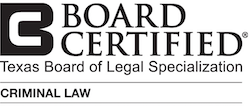Texas DWI Defense Overview
If you have been arrested for a Driving While Intoxicated (DWI), Driving Under the Influence (DUI), or any other intoxication-related criminal offense, it is crucial you seek the legal advice and assistance of an experienced Texas DWI Attorney. The laws in Texas can be particularly harsh relating to all Driving While Intoxicated charges, and the potential punishments and penalties can be incredibly burdensome. If you have been arrested for a DWI charge in Texas, you could be facing potential jail time, fines, court costs, community service, probation, and a possible driver's license suspension. It is vitally important to get representation and counsel from an experienced and aggressive Texas DWI Defense Attorney immediately to begin protecting your freedom to immediately start mounting a formidable defense. The severity of possible punishment can depend on a number of factors, including whether a minor was in the car at the time of the offense (classified as a "DWI with Child" - a State Jail Felony), whether this is your first offense, and whether anyone was seriously injured as a result of possible impairment (which could be classified as some form of a Felony, such as Intoxication Assault or Intoxication Manslaughter).
As an experienced Texas DWI Defense Attorney, Carl David Ceder can help to offer vital guidance to assist through what is most often a very difficult time. Most people accused of DWI have never had to face any criminal charges in the justice system, other than possibly various encounters with routine traffic violations. Carl and his legal team will always welcome the opportunity to assist during this process to help guide you through the process with hopefully the least amount of difficulty as possible.
Driving While Intoxicated (DWI) Charges
According to Texas Law, a person commits the offense of DWI if they are operate a motor vehicle while intoxicated in a public place. Section 49 of the Texas Penal Code governs the laws against Driving While Intoxicated offenses. The potential range of punishment greatly differs based on the differing factors of an arrest, whether the accused has any prior alcohol related arrests and/or convictions, whether there is a chemical test that was obtained, and based on whether an accident or an injury occured. There are many different ways to fight, and possibly defense, a charge of Driving While Intoxicated. To read more about possible DWI Defenses, please read here.
Two Separate Legal Proceedings
People accused for a DWI in Texas usually do not realize that they face two separate legal proceedings after being arrested.
• Criminal Action: The actual DWI arrest itself is criminal charge that will be prosecuted by the State of Texas usually in the county where the offense occurred (unless some portion of the arrest invokes federal law). This is the portion people are most familiar with. A DWI conviction can lead to a variety of penalties including jail time, a probationary period, a requirement of having ignition interlock placed on youer vehicle, a suspended license, community service hours, and possible large fines and court costs. At The Law Offices of Carl David Ceder we will fight to get you the best possible outcome under the circumstances of your DWI arrest.
• Civil Action: The other component related to a DWI arrest is purely civil in nature, and is prosecuted by the State of Texas through the Department of Public Safety (DPS). This is the administrative portion of a DWI arrest where the state will attempt to suspend your license to drive. A suspension will occur automatically, unless you (or your attorney) within 15 days requests an Administrative License Revocation (ALR) hearing. This is a process where you contest the suspension of your driving privileges. By law, you are entitled to have a hearing on the merits related to your DWI arrest where the State will be forced to prove that you were Driving While Intoxicated (albeit in a civil setting). To read more about "ALR" hearings, please read here.
Intoxication
Usually the "intoxication" element related to a DWI arrest is a contested issue that many simply disagree with. Whether a driver is "intoxicated" is entirely up to to the subjective interpretation of the investigating officer. When analyzing this, it is often referred to as an "opinion crime." Many factors leading up to the arrest are simply not made available to the investigating officer, such as reasons which may include fatigue or nervousness, possible medical conditions, or other reasons that they have mistakenly attribute to intoxication. The guage by which the investigating officers are trained to determine whether someone is "intoxicated" - by law - is whether they have lost the "normal use" of their mental and/or physical faculties by reason of the introduction of alcohol, or another intoxicating substance. Obviously, whether someone has lost their "normal" use of their mental and/or physical faculties is highly discretionary, and it is a very ambigious way to make such a determination.
Intoxication is defined under Section 49.01 of the Texas Penal Code.
Texas Penal Code: Section 49.01(2) - "Intoxicated" means:
(A) not having the normal use of mental or physical faculties by reason of the introduction of alcohol, a controlled substance, a drug, a dangerous drug, a combination of two or more of those substances, or any other substance into the body; or
(B) having an alcohol concentration of 0.08 or more.
It should be noted, that theoretically the prosecutor only needs to prove one of the three ways in order to obtain a conviction. For example, if the jury believes the person has lost their physical faculties, although they have not lost their mental faculties and there is no blood or breath test, theoretically that person could be found guilty. That is not always the case, generally, if the evidence only shows the loss of either the mental or physical faculties, and not both, there is usually a logical explanation for that loss and the result should be they are not intoxicated.
Experienced Criminal Defense
It is crucial that you seek counsel from an experienced Texas DWI Defense Attorney If you have been charged with DWI or any other intoxication-related criminal offense. Carl David Ceder is an aggressive, honest, and ethical DWI Defense Attorney who is committed to protecting the rights and freedom of the clients he represents. Please Call 214.702.CARL(2275) or 469.2000.DWI(394) at any time to discuss your case with Carl or another representative of his legal team.




















